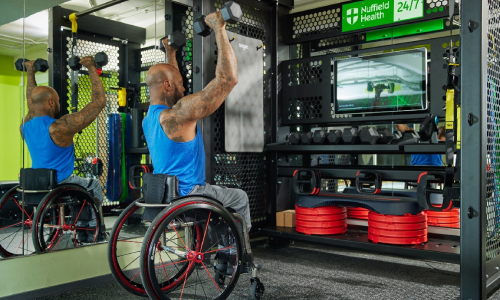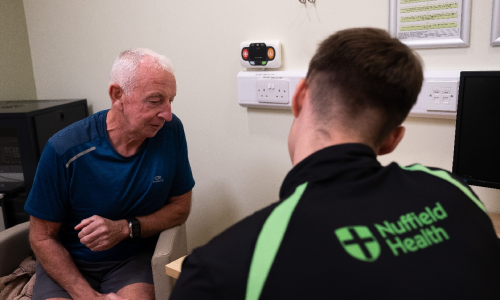Prostate health | Spotting problems like enlargement and cancer
If you’re concerned about the health of your prostate, keep reading to find out how to spot issues as early as possible.
What is the prostate?
The prostate is a small gland (around the size of a walnut) that forms part of the male reproductive system. It’s located around the urethra, just below the bladder.
What does it do?
The prostate plays a vital role in producing some of the fluid found in semen. This fluid contains key enzymes like zinc and citric acid, which are required to nourish sperm and help lubricate the urethra for ejaculation when a man orgasms.
What is an enlarged prostate?

You’ve probably heard about the prostate becoming “enlarged” as we age.
The good news is that (to some degree) prostate enlargement (also known as benign prostatic hyperplasia, or BPH) happens to almost all men as they get older.
It’s completely natural and simply means that the prostate has grown in size. Whilst we’re still unclear why this happens, it’s thought that factors like changes to testosterone levels and the cells in the testicles may contribute to the gland growing in size as men get older.
Is an enlarged always prostate a problem?
There’s not a simple answer to this question, as it all depends on the amount of growth and the severity of symptoms.
In some men, as the prostate becomes enlarged, it starts to put additional pressure on the bladder and the urethra. This can affect how urine passes through the body. If symptoms begin to affect day to day life, treatment may be advised by a professional.
In others, prostate growth doesn’t cause any major problems and symptoms are mild and don’t require treatment.
What signs should I look out for?
Due to the position of the prostate, growth can interfere with the normal function of the urethra (the tube that carries urine).
This can lead to the development of certain urinary problems as we get older, including:
- Weak flow
- Difficulty starting or stopping
- Difficulty maintaining urine flow
- Leaking or dribbling urine
- Needing to urinate more frequently
- Waking during the night to urinate
- Needing to urinate right after finishing (incomplete emptying)
- Urgent need to urinate.
What should I do if I’m concerned?
If you’re worried or concerned about the health of your prostate or any of the problems above, contact your GP and explain your symptoms.
You may require an examination and some blood or urine tests to determine the cause. For benign prostatic hyperplasia (BPH), there are tablets your GP can prescribe you which can be taken to help shrink the prostate.
If this doesn’t work, you may need to see a Urology Specialist who can conduct further tests and potentially offer surgery (when appropriate) to help relieve your symptoms.
What is prostate cancer?
Prostate cancer refers to any cancerous growth that occurs in the prostate gland.
It is a slow developing cancer, meaning symptoms can go undetected for a long time. Prostate cancer is not linked to any preventable risk factors, but there are things that you can do to reduce the risk of developing the cancer.
How common is prostate cancer?
There are around 52,300 new cases of prostate cancer in the UK every year, with 34% of these new cases being diagnosed in men over 75.
Who is at risk?
- Age – prostate cancer is most common in men aged between 75 and 79 but men over the age of 50 are at risk
- Ethnic group – prostate cancer is more common in men of Black ethnic origin (1 in 4 lifetime risk) and Caucasian men (1 in 8 lifetime risk). It is less common in men of Asian origin
- Family history – having a 1stdegree male relative (brother or father) who has had a prostate cancer diagnosis under the age of 60 seems to increase risk. Having a close female relative with breast or ovarian cancer may also increase your risk if they are a BRCA gene carrier.
What are the signs of prostate cancer
Prostate cancer doesn’t usually present with any symptoms to start with.
It is only when the tumour and the prostate has grown a sufficient size (where it starts to press on the urethra) that men typically start to notice presentable symptoms.
Like with the benign prostatic hypertrophy mentioned above, all the symptoms can be the same, but with some important additional signs:
- Difficulty starting or stopping urination
- Difficulty maintaining urine flow
- Weak flow when urinating
- Leaking or dribbling urine
- Needing to urinate more frequently
- Waking during the night to urinate
- Needing to urinate right after finishing (incomplete emptying)
- Urgent need to urinate.
Additionally, some men notice:
- Lower back or bone pain
- Feeling tired all the time
- Erectile dysfunction
- Blood in the urine
- Loss of appetite, weight loss.
What should I do?

Contact your GP and explain your symptoms.
You may require an examination and blood test like the PSA (Prostate Specific Antigen) and urine test to determine the cause. If there is a possibility it could be cancer, you will be referred to a specialist who will likely arrange an MRI Scan to see if there are signs of cancer in the prostate.
If the scan shows abnormal changes then the specialist will recommend a biopsy to determine the diagnosis.
Assess your risk at home
Every year, over 50,000 men in the UK are diagnosed with prostate cancer. Research also shows that men are reluctant to book in for an examination because of stigma and embarrassment (men are statistically more likely to avoid going to the doctor than women).
The Prostate Cancer UK Risk Checker allows you to check your risk status for prostate cancer at home in under 30 seconds. Answer 3 simple questions and this free tool will determine whether any further action is necessary.
Don't delay. Click here to assess your risk now
What is the survival rate?
In the UK, prostate cancer has a survival rate of around 78%. This rate has improved in recent decades due to the introduction of the PSA blood test.
Whilst survival rates are high, it’s still important to get a prostate screening, especially if you are over 50.
Getting a screening for prostate cancer
A PSA blood test can detect high levels of prostate-specific antigen in the blood. PSA is a substance made by the prostate and can be elevated in men who have prostate cancer.
Levels can also be elevated in men who have an enlarged or swollen prostate, making a PSA blood test a non-reliable method for detecting prostate cancer.
High PSA levels aren’t the only indicator of prostate cancer. It’s estimated that 15 in every 100 men with prostate cancer have normal PSA levels. If you have raised PSA levels, a scan and maybe a biopsy may be required to investigate further.
A screening also involves a prostate exam and asking some questions about your family history and any urinary symptoms you may be experiencing.
The prostate and erectile dysfunction
Yes, the two can be closely linked due to the position of the gland and the role it plays in the male reproductive system.
For example, if you’ve had prostate cancer surgery, the tissue removal process may have caused damage to some of the nerves or arteries that are integral for achieving an erection.
Research indicates that anywhere between 25% and 80% of men who have had their prostate removed will struggle to achieve an erection post-surgery.
It’s thought that some of the treatments involved in treating an enlarged prostate may also cause erectile dysfunction. This includes certain drugs and medications that are routinely prescribed to help treat the symptoms of benign prostatic hyperplasia.
Whilst problems with the prostate can be a cause of erectile dysfunction (ED), it’s important to remember that there are a wide range of other physical and psychological factors that can cause ED. A man’s lifestyle, mental health, and the presence of an underlying physical health condition can all make achieving and maintaining an erection more difficult.
How can I take better care of my prostate?
Whilst prostate problems aren’t thought to be linked to any preventable risk factors, there are some things you can do to maintain good prostate health.
- Keep physically active
- Eat less salt
- Limit how much red meat you eat
- Consume a balanced diet and eat plenty of fruit and vegetables
- Maintain healthy Vitamin D levels - Get plenty of natural sunlight whilst being sun aware
Whilst lots of these tips are all about maintaining good overall health and avoiding unhealthy habits, there are other bits of advice that are more specific, like avoiding Vitamin E supplements. Studies show that consumption of this specific vitamin supplement could increase your risk of developing prostate cancer by as much as 17%.
Last updated Tuesday 20 August 2024
First published on Wednesday 22 May 2024

